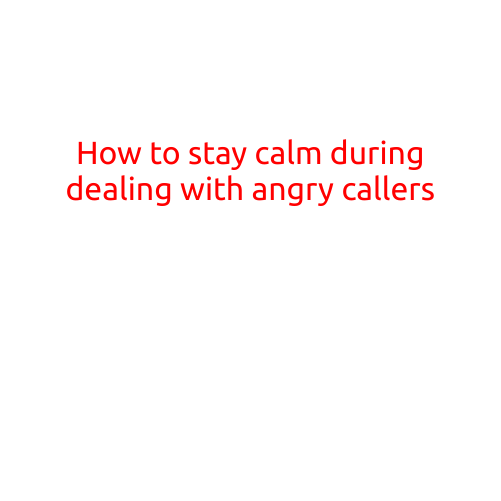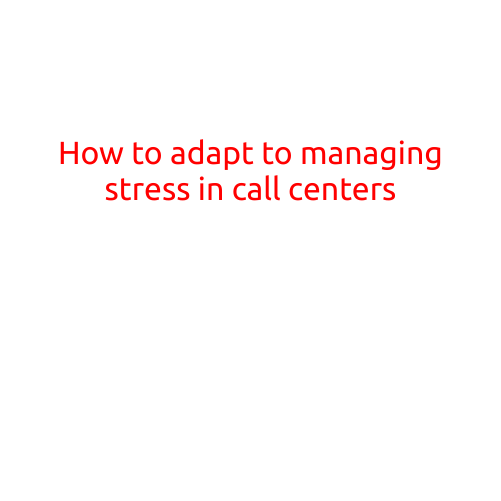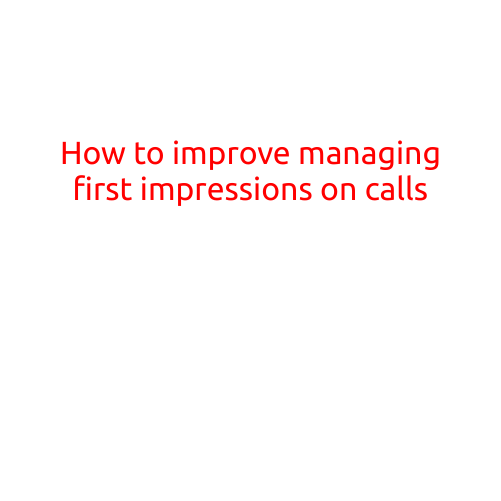
How to Stay Calm During Dealing with Angry Callers
Dealing with angry callers can be a daunting task, especially in high-pressure customer service roles. It’s natural to feel frustrated, annoyed, or even defensive when faced with aggressive or rude individuals. However, losing your cool can escalate the situation, causing harm to both the customer and your organization. In this article, we’ll explore some effective strategies to help you stay calm and composed when dealing with angry callers.
1. Prepare Yourself
Before answering angry calls, take a few deep breaths, and mentally prepare yourself for the conversation. Remember that you’re not taking their anger personally; you’re there to listen, assist, and resolve the issue. Visualize a calm, composed, and patient you. This mental preparation will help you stay focused and centered.
2. Acknowledge and Empathize
Begin the conversation by acknowledging the customer’s frustration and showing empathy. Use phrases like, “I understand that you’re upset, and I’m here to help you resolve this issue.” Avoid dismissing their concerns or apologizing prematurely. Listen attentively to their issue, and summarize their complaint to demonstrate you’re actively listening.
3. Stay Calm and Composed
Maintain a calm tone and pace while speaking. Speak slowly, clearly, and respectfully. Avoid getting defensive or matching their level of hostility. Instead, focus on staying rational and objective. Use a firm, yet gentle tone, and emphasize the importance of resolving the issue amicably.
4. Focus on Solutions
Shift the conversation from the problem to potential solutions. Offer alternatives, alternatives, and compromises. Be flexible and open to finding a mutually beneficial outcome. Remember, your goal is to resolve the issue, not win an argument.
5. Set Boundaries
Don’t tolerate abusive or aggressive behavior. Politely state your organization’s policies and procedures, and remind the customer that you’re there to assist, not to be taken advantage of. Firmly yet respectfully, set boundaries and reiterate that you’re committed to finding a solution within those boundaries.
6. Practice Active Listening
Pay attention to the caller’s words, tone, and body language. Repeat back what you’ve understood from their conversation, and ask clarifying questions to ensure you’re on the right track. This active listening will help de-escalate the situation and build trust.
7. Know Your Stuff
Stay knowledgeable about your products, services, and company policies. This confidence will help you respond effectively to common concerns and objections, reducing the likelihood of misunderstandings and frustration.
8. Don’t Take it Personally
Remember that the caller’s anger is often a result of a personal issue or current circumstance. Avoid taking their anger personally and maintain your professional composure. You’re there to help resolve the issue, not engage in a personal fight.
9. Stay Flexible
Be willing to adapt your approach if the situation requires it. Sometimes, a different tone or approach may be necessary to diffuse the tension. Stay flexible and open to new strategies, and prioritize resolving the issue over your own ego.
10. Follow Up
After the call, take a moment to reflect on the interaction. Identify what you did well, and what you could improve upon. Follow up with a gesture of goodwill, such as a compensation or a free trial, to demonstrate your commitment to customer satisfaction.
In conclusion, staying calm during angry calls requires a combination of preparation, empathy, and effective communication. By following these tips, you’ll be better equipped to handle even the most challenging situations with poise, professionalism, and a commitment to resolving the issue to the customer’s satisfaction.





